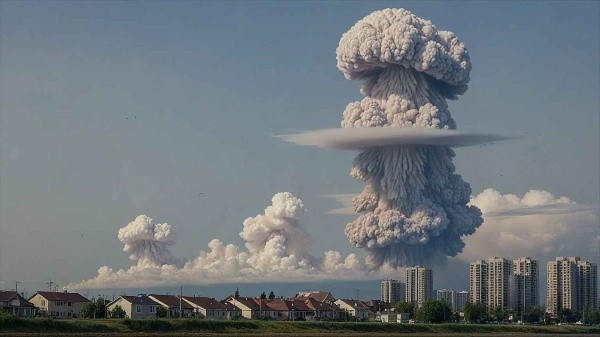Iran’s Plan to Strike Back Against the U.S.
Iran’s Military Preparations Following U.S. Attacks
Loading...

Hezbollah vows to fire more rockets until Israel stops air strikes and ground invasion in Lebanon.
Hezbollah’s acting chief has warned the group plans to fire rockets into more areas of Israel until the Netanyahu government stops its air strikes and ends its ground invasion of Lebanon.
“I am telling the Israeli home front: The solution is a ceasefire,” Naim Qassem said in a speech broadcast live on Tuesday, adding that the group would not be defeated by the ongoing bombardment of its strongholds as well as the killing of its leadership.
Qassem said Hezbollah is focused on “hurting the enemy”, signalling that it would ramp up attacks further south in Israel.
Qassem has led the group since September 27 of this year, when its longtime leader, Hassan Nasrallah, was assassinated in an Israeli air strike in Beirut’s southern suburbs.
He added that a ceasefire in the besieged and bombarded Gaza Strip is the “solution” to end the escalating conflict.
“We cannot separate Lebanon from Palestine, or Palestine from the world,” he said.
Hezbollah and Israel have been exchanging near-daily cross-border fire since Israel launched its ongoing deadly assault on Gaza in October last year. Fighting only intensified in mid-September, when Israel started bombarding the country, including the densely populated capital Beirut.
Israel launched a ground offensive in southern Lebanon a week later.
Lebanon’s Health Ministry said at least 2,350 people have been killed since the start of the Israeli assault on Lebanon. At least 1,740 people have been killed across the country since mid-September, while more than one million people have been forced to flee their homes in parts of Lebanon’s south and east.
Cross-border attacks continue
In another day of fighting, Hezbollah said it launched a barrage of rockets towards Haifa and targeted Israeli bulldozers and a tank near the border.
Israel responded with air strikes across Lebanon, a day after an estimated 41 people were killed in attacks on the country. In the latest of the attacks, at least 10 people were killed and 15 wounded in an Israeli strike on Qana in southern Lebanon, Lebanon’s National News Agency reported.
Israel’s military targeted several areas in southern and eastern Lebanon on Tuesday, including in the Bekaa Valley where a hospital in Baalbek city was put out of service, Lebanon’s official National News Agency reported.
Hezbollah, meanwhile, said it downed two Israeli drones on Tuesday, adding that the second was seen “burning” over Israeli territory.
Al Jazeera’s Ali Hashem, reporting from Beirut, said Qassem “projected more confidence in the collective leadership of Hezbollah”.
“Qassem’s message was that the group has already turned the page of the assassination of its leader as well as the pager and walkie-talkie attacks,” Hashem said. “Hezbollah has capabilities to hit the whole Israel and Qassem said the group has been adopting a new strategy that is inflicting pain on Israel.”
Israel’s Prime Minister Benjamin Netanyahu earlier told France’s President Emmanuel Macron he opposed any “unilateral ceasefire, which does not change the security situation in Lebanon”.
Lebanon’s Prime Minister Najib Mikati, meanwhile, said that his country was ready to bolster its military presence in the south after any ceasefire in cooperation with the United Nations Interim Force in Lebanon (UNIFIL).
Mikati told Al Jazeera that security has been tightened at ports, land crossings and its only international airport in Beirut “to remove any pretexts” for an Israeli attack. He added that the US has given “some kind of a guarantee” that Israel will de-escalate its attacks on the capital.
Later on Tuesday, Italy’s Prime Minister Giorgia Meloni said she plans to visit Lebanon on October 18.
Editor
Iran’s Military Preparations Following U.S. Attacks
Troops remain in five strategic locations, raising fears of renewed tensions and long-term occupation.
Opposition forces have taken control of the capital after a significant offensive. Here is how it unravelled.
